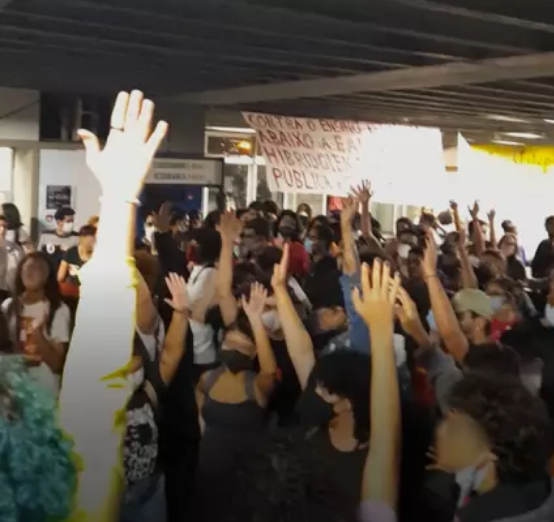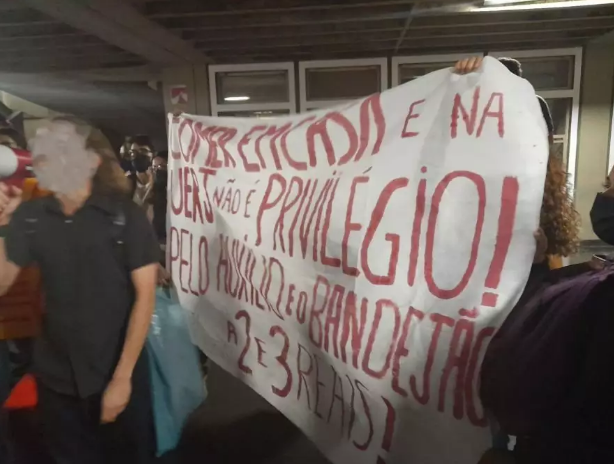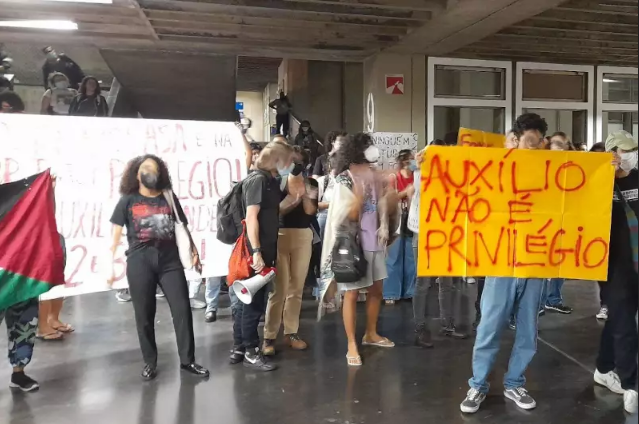We publish an unofficial translation of an article from A Nova Democracia (AND)
RJ: Uerj students protest in defence of the "bandejão" and student aid

Mobilisation at Uerj: Students fight for the right to food. Photo: AND database
At the end of June and beginning of July, students from the Revolutionary Popular Student Movement (MEPR), the Revista Veias Abertas and independent groups protested at the University of the State of Rio de Janeiro (Uerj) for the maintenance of the food allowance and the price of the "bandejão" (a tray) of R$2 and R$3. Today, students who receive a food allowance of R$300 can no longer pay the normal price at the "bandejão", but must pay R$14.25 per meal. One action took place on 30 June and another is planned for 25 July.
The justification given by the parish office, through Pró-Reitoria 4, which is responsible for student policy and support, is that the state of Rio de Janeiro, according to its "laws", cannot subsidise the value for the "bandejão", as it has already paid for the maintenance of the meal allowance even after classes have started on site. This claim is condemned by students as arbitrary, violating students' rights, and an anti-democratic measure that does not respect the interests of the student body. In practice, the parish office within the university denies the same rights that the federal and state governments (of reactionaries Jair Bolsonaro and Claudio Castro) deny to all the people.

Banners defending the subsidy and the "bandejão" for R$2 and R$3. Photo: Banco de Dados AND
Start of the mobilisations
At the end of June, on 27 June, students were surprised by having to show their CPF, photo ID and matriculation number to pay for entry to the university restaurant. In the past, the procedure was simple: the student presented an application, paid by pix and went to eat. The students as a whole, but especially the quota holders, could use the enrolment of other colleagues who did not receive aid to pay the amount of R$ 2 and R$ 3. In this way, the right to food was practically guaranteed.
Since the parish office introduced the requirement of proof with photo ID, many students were harmed. This is because the bill does not add up: If the student eats two meals a day, he or she spends R$570 at the end of the month, while the allowance is only R$300. This is the reality of most full-time courses, except for most students who do internships between courses and use the university structure for lunch and dinner. Given the increasing poverty and hunger throughout the country, and the fact that Rio de Janeiro has one of the most expensive baskets of basic food (R$ 733.14 with an increase of 18.39% in 12 months), this claim was taken up by Uerj students.

Students discuss the direction of the struggle for rights. Photo: AND database
Uerj security forces try to prevent the mobilisation and harass students.
As part of the mobilisation, students made banners and posters and distributed leaflets promoting the story of the struggle for the "bandejão" for R$2 and R$3. On this occasion, the students were also asked to participate in the action to defend the maintenance of aid. Alarmed by the increasing encouragement from the students, the security forces began to approach students all over the campus and forbid the distribution of leaflets. One of the security guards snatched the placard from the hand of a student who entered the building, which read, "If you take away the lunch money, there will be an occupation" before the act took place. The student pulled it back and was not intimidated.
In another attempt to intimidate the student movement in Uerj, a security guard chased a student who was distributing leaflets and threatened him with the false claim that the activist was committing an offence of "defamation of a public servant". The intimidation was recorded by members of Open Veins Magazine and posted on their Instagram page:

Action denounces anti-democratic stance of parish office
The students marched through the university buildings with placards, banners and slogans. Speeches denounced the actions of the new rector. In order to deny the students their right, the parish office claimed that the accumulation of the benefits of the food stipend, together with the maintenance of the value of R$2 and R$3, would constitute a "privilege". The students showed the farce of this argument by denouncing that in February a vice-principal received R$ 31,840.79 plus R$ 62,562.79 in "contingent allowances", a total (with the rebates) of R$ 82 thousand. This is the true privilege of a few.
Former rector Ricardo Lodi was on the university campus during the demonstration at an election meeting on "student aid". This is where the students went to rally at the end of the performance. On the march, the students shouted: "For the help and the "bandejão", we will not give up any rights!"
The rectorate and its false "little revolution“
The former rector, the lawyer Ricardo Lodi, has been claiming in the election campaign since the end of March that his government was a "small revolution". Under his administration, aid during the pandemic and the purchase of some buildings for Uerj, among other things, were carried out. Presumptuous and opportunistic, Lodi hides his authoritarian position from the university community, which has historical demands that have not been met by this and previous rectorships. The Association of Professors of Uerj (Asduerj) positioned itself against the holding of an online meeting of the university's Board of Governors to change the organisational structure with the creation of the "Attorney General of Uerj". The lawyers of the institution would have the same rights and salaries as state lawyers. The students denounce that all the assistance provided (food, transport, day care) has an expiry date and that in reality they have not become rights: They have not come into effect and depend on the Uerj budget and how the parish office will distribute the funds. This year the budget was R$1.4 billion.
During his time as rector, Lodi boasted about the purchase of buildings for the Uerj, but without taking off the table historic projects of the university community such as the university's day care centre, the establishment of a cafeteria on the other campuses of the Uerj (São Gonçalo and Caxias) or the construction of student housing. Other long-standing demands, such as the nationalisation of the "bandejão" and the transformation of all outsourced university workers into professionals, without the need for an audit, since these professionals already perform these tasks effectively, albeit precariously, through outsourced companies, are also ignored. The actions of the UERJ rectorate in the last two years are populist and do not change the structure of the university, as they do not guarantee the retention of students after December 2022 - according to the students' complaint.
The "bandejão" for R$ 2 and R$ 3 is a conquered right!
In 2011, the university restaurant was opened after a series of demonstrations demanding the students' right to permanent residence. The restaurant was built in a building that would otherwise have housed a garage, initially priced at R$3 and R$4, and Uerj quickly outsourced the service. From the beginning, there was no capacity to serve all the students from the 4 buildings in the Maracanã area. When the tray opened in 2011, students protested the abusive price and were attacked by security personnel. Uerj's tray was and is one of the most expensive in Rio.
In 2017, the tray had been closed for a year amid attacks that Uerj was going through, with funding cuts preventing the renewal of the contract with the company. In October, students occupied the bandejão and reopened it single-handedly, organising 30 days of cleaning, catering, collection and maintenance of the space. With the help of the student co-government, the occupation managed to keep the "bandejão" open until the pandemic and its naming in honour of Bruno Alves, a history student who died in a train accident. Bruno had not received his scholarship and jumped over the wall of the train to get home.
